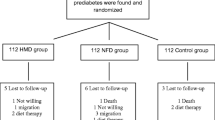In a 3-month study, 30 obese patients were assigned to lifestyle modification therapy, which is the major component of all modern strategies correcting the metabolic syndrome. The 3-month course of non-pharmacological therapy significantly diminished the major index evaluating the state of these patients, i.e., the risk of cardiovascular disasters. This therapy positively affected all the states associated with metabolic syndrome: arterial BP attained the targets in 53% patients together with normalization of their nocturnal arterial BP dipping status; the lipid panel and carbohydrate metabolic indices normalized in 46 and 44% patients, respectively; hepatic steatosis moderated in 56% patients; and the disturbances in hemostasis were annihilated in 67% patients.
Similar content being viewed by others
References
European guidelines on prevention of cardiovascular disease in clinical practice (revised in 2012). Ross. Kardiol. Zh. 2012(4, Suppl. 2). Russian.
Kalashnikova MF. Metabolic syndrome: a modern view on concept, prevention methods and treatment. Effekt. Farmakoter. 2013(52):52-63. Russian.
Prevention of cardiovascular diseases. Recommendations of All-Russian Scientific Cardiological Society. Kardiovaskular. Ter. Prof. 2011;10(6, Suppl. 2). Russian.
Kovaleva ON. Clinical effects of lifestyle modifi cation in obesity. Zdorov’e Ukrainy. 2007;10(1):68-69. Russian.
Kseneva IS, Yurmazov ZA, Udut VV. Effect of non-pharmacological correction of metabolic syndrome on the condition of the prostate gland in young patients. Evraz. Soyuz Uchenykh. 2016(2, Pt 2):64-66. Russian.
Mekhtiev SN, Grinevich VB, Kravchuk YuA, Brashchenkova AV. Nonalcoholic fatty liver disease: clinical features, diagnosis, and treatment. Lech. Vrach. 2008(2):29-37. Russian.
American Diabetes association. Standards of medical care in diabetes. Diabetes Care. 2008;31(Suppl. 1):12-54.
Bastien M, Poirier P, Lemieux I, Després JP. Overview of epidemiology and contribution of obesity to cardiovascular disease. Prog. Cardiovasc. Dis. 2014;56(4):369-381.
Chiasson JL, Josse RG, Gomis R, Hanefeld M, Karasik A, Laakso M; STOP-NIDDM Trial Research Group. Acarbose treatment and the risk of cardiovascular disease and hypertension in patients with impaired glucose tolerance: the STOPNIDDM trial. JAMA. 2003;290(4):486-494.
Lindström J, Louheranta A, Mannelin M, Rastas M, Salminen V, Eriksson J, Uusitupa M, Tuomilehto J; Finnish Diabetes Prevention Study Group. The Finnish Diabetes Prevention Study (DPS): Lifestyle intervention and 3-year results on diet and physical activity. Diabetes Care. 2003;26(12):3230-3236.
Solovyev MA, Tutrin II, Udut VV, Borodulina EV, Turenko AV. Global tests evaluating the functional condition of hemostasis. J. Clin. Exp. Pharmacol. 2015;5:178. doi:10.4172/2161-1459.1000178.
Author information
Authors and Affiliations
Corresponding author
Additional information
Translated from Byulleten’ Eksperimental’noi Biologii i Meditsiny, Vol. 162, No. 7, pp. 46-49, July, 2016
Rights and permissions
About this article
Cite this article
Kseneva, S.I., Borodulina, E.V., Trifonova, O.Y. et al. Effectiveness of Lifestyle Modification in Corrections of States Associated with Metabolic Syndrome. Bull Exp Biol Med 162, 38–41 (2016). https://doi.org/10.1007/s10517-016-3539-3
Received:
Published:
Issue Date:
DOI: https://doi.org/10.1007/s10517-016-3539-3




